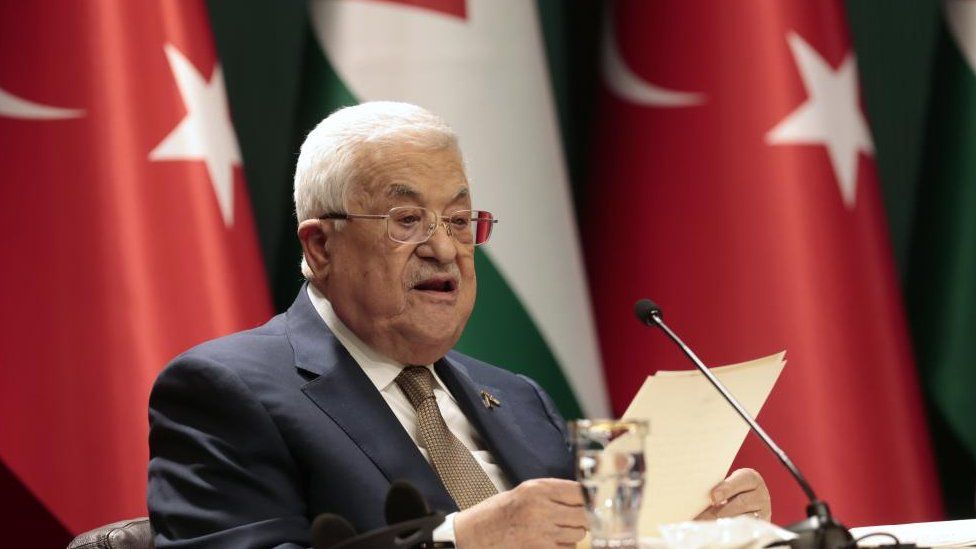If you wanted to map the path to a healthy, functioning Palestinian government, you probably wouldn't start from here.
The last time Palestinians had the chance to vote for their national leaders was 18 years ago, and those elections sparked a civil war in Palestinian politics.
That isn't a metaphor: Hamas, which won the elections, and Fatah, the biggest political faction, were shooting each other in Gaza's streets.
The fighting ended with Hamas taking control of Gaza, and Fatah running the occupied West Bank through the Palestinian Authority (PA).
It was a political cold war that lasted for a generation. That is where this journey starts.
The 7 October Hamas attacks on Israel, and the war in Gaza, ripped that picture to shreds: Israel says it is intent on eliminating Hamas as a governing and military force in Gaza. International eyes have turned towards the PA as the vehicle that might - with enough reform - carry Palestinians into a new, united post-war era.
There are many challenges ahead.
The first is credibility. The Gaza war might have exploded Palestinian politics, but one of the few things it hasn't changed is disillusionment with the PA, the body that the US is banking on to take charge of Gaza.
It is widely seen as corrupt and inefficient, and - by some - as a security enforcer for the Israeli government in the West Bank.
A poll this week by the respected Palestinian Centre for Policy and Survey Research in Ramallah suggested that a majority of Palestinians think the PA should be dissolved. And satisfaction with its president in the West Bank, Mahmoud Abbas, was just 8%.
Mr Abbas has replaced his Prime Minister, Mohammad Shtayyeh, in an effort to signal reform - or "renewal" as the American government has termed it. But it has not really moved the dial.
The new prime minister, an economist called Mohammad Mustafa, has been tasked with heading a technocratic interim government, and bringing together all the Palestinian political factions - including Hamas - to find some sort of consensus around a new unified vision for the future.
And that is the second challenge: unity.
Sabri Saidam, a senior Fatah official, told me that the resignation of the government was designed to "open up the floor" to other factions - like Hamas - and give them "the space to reconsider their political stance, and their obligations in the future - and also their role, given the changes that have happened since 7 October".
"We have been talking to Hamas indirectly," he said. "We have restated the importance of adhering to the […] two-state solution," referring to the idea that Israelis and Palestinians could live side-by-side in separate countries.
"And we have received positive signs."
Last month, representatives from Fatah and Hamas sat down in Moscow with other Palestinian factions to discuss a way forward.
It was seen as a positive sign that Hamas backed a statement from that meeting, pledging support for the Palestine Liberation Organisation (PLO), an umbrella group for Palestinian political movements that negotiated a previous peace deal with Israel.
But that feelgood moment in Moscow was quickly shattered when Hamas reacted furiously to the appointment of Mr Mustafa, accusing Mahmoud Abbas of acting unilaterally and taking "empty steps" without national consensus.
"Hamas did not react the way we had anticipated," said Sabri Saidam, although he believes it follows a familiar pattern of behaviour by the group.
"We hear some positive remarks [from Hamas], but then when it comes to practical engagement, there's always a setback," he told me.
"This time, things have to be different. We don't have the luxury of time to play with words without walking the talk."
Fatah hit back, accusing Hamas of triggering "a catastrophe" for the Palestinian people by attacking Israel on 7 October; a catastrophe that was worse, it said, than the displacement of hundreds of thousands of Palestinians in 1948, when the Israeli state was created.
Sabri Saidam says the party is now waiting to see whether this incident marks the end of Hamas talking to the PLO, "or is just a reflection of the chaos Hamas is in".
MORE OF THIS AT: https://www.bbc.co.uk/news/world-middle-east-68636033

No comments:
Post a Comment